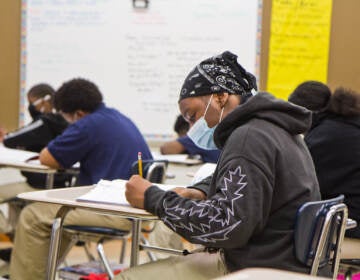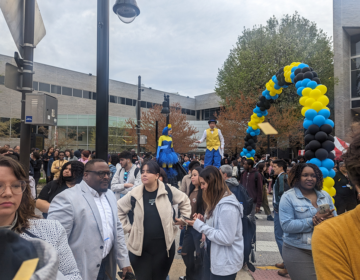Angered by college response to sexual assault, Swarthmore students stage sit-in
Since Tuesday, activists have camped out in the offices of two deans they want fired.
Listen 1:50-
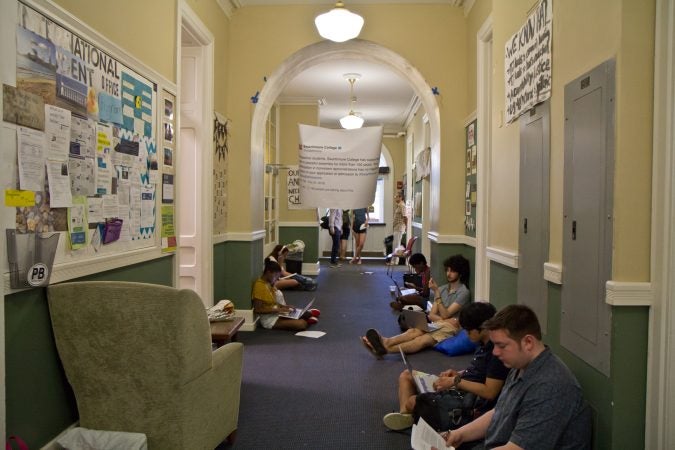
Swarthmore students are staging a sit-in at the college administration offices in protest of the school's sexual assault-reporting policy. (Kimberly Paynter/WHYY)
-

Swarthmore freshman Hope Darris participates in a sit-in at the administration offices in protest of the school's sexual assault- reporting policy. (Kimberly Paynter/WHYY)
-
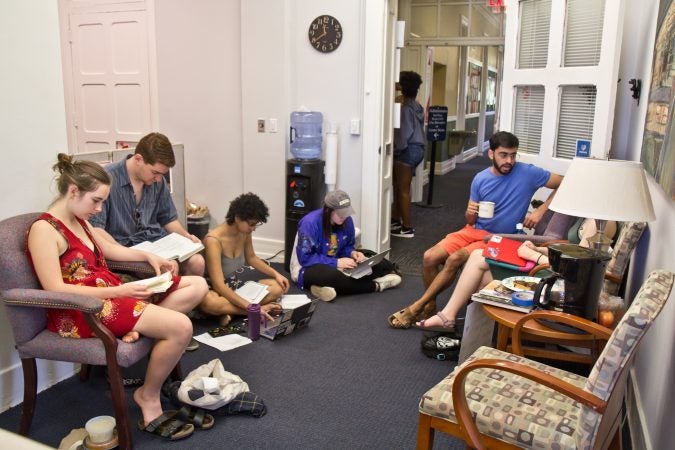
Swarthmore students sit outside the office of Liz Braun, dean of students. (Kimberly Paynter/WHYY)
-
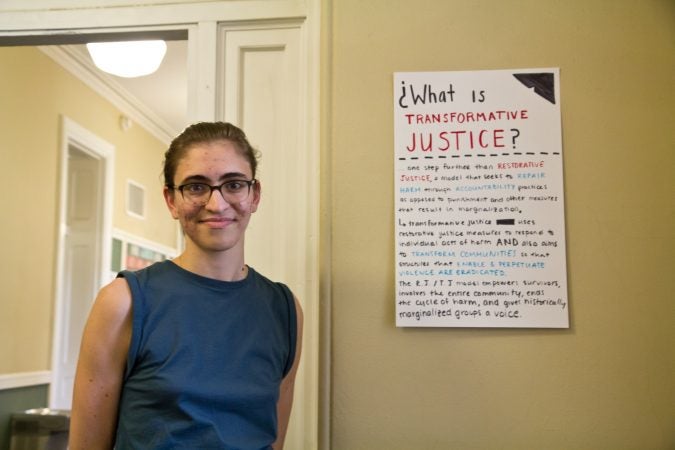
Swarthmore student Priya Dieterich helped organize the sit-in at the college administration offices. (Kimberly Paynter/WHYY)
-

Swarthmore student Morgin Goldberg sits in the office of Liz Braun, dean of students, to protest the school's handling of sexual assault allegations. (Kimberly Paynter/WHYY)
In the spring of her junior year, Swarthmore College senior Lydia Koku said she was the victim of “intimate partner violence” at the hands of her then-boyfriend.
As soon as it happened, she texted her friends — not just for support, but because she wanted to leave a trail of evidence.
“I knew that I wouldn’t be believed,” said Koku. “I knew that my memory would be questioned.”
Koku and other activists at the small, liberal arts college in Delaware County say their school isn’t living up to its progressive image.
They believe administrators handle sexual assault cases clumsily and that staffers routinely ask inappropriate questions when investigating allegations of rape and assault.
“That’s where I think some of the disappointment … comes from,” said junior Morgin Goldberg. “It’s having faith in an institution because of what it tells you it’s all about — and it not actually being about that at all.”
Goldberg, who said she was raped by a fellow Swarthmore student her freshman year, said administrators botched the seven-and-a-half hour hearing that followed. Multiple students also complained of investigations that dragged on for months.
In response to what they consider a systemic problem, students from the newly formed campus group Organizing for Survivors (O4S) have issued a list of demands that includes firing two deans. They’ve been camped in the office of Liz Baum, dean of students, since Tuesday morning. They’ve since spread to associate dean Nathan Miller’s office.
The students don’t plan to leave until they get an apology from college president Valerie Smith and a pledge that major changes are forthcoming.
The college has been mostly mum since the protest began.
Smith wrote a letter to the community Tuesday, and in a statement told WHYY:
“I will go to great lengths to protect our students’ rights to peaceful protest and assembly. However, I can’t support ad hominem attacks on individuals. I am evaluating every allegation that has been brought against members of the staff.
“I deeply regret any pain or burden students have borne unnecessarily due to our Title IX processes and procedures. I remain firm in my belief that we all share a commitment to ensuring that every member of our community is safe from violence of all kinds and able to live, work, and thrive on our campus.”
This isn’t the first time Swarthmore has come under scrutiny for how it adjudicates sexual assault cases. In 2013, the U.S. Department of Education’s Office of Civil Rights investigated Swarthmore for allegedly mishandling sexual assault allegations and mistreating accusers.
A year later, the school reversed its findings in a case that led to the expulsion of a student accused of sexual misconduct. The expelled student sued, prompting Swarthmore’s reversal.
There was no one incident that prompted the latest campus uproar over how school officials handle sexual assault.
In December, an anonymous student published an article in Voices, a campus publication, about the frustrations of going through the college’s adjudication process on sexual assault. Two months later, Koku penned a similar story and called on students to organize.
The response, Koku said, was swift and overwhelming.
“Within the first three hours of publication, I had already received 20 emails,” she said.
Those emails led to the formation of O4S, which led to the list of demands, which has led to the sit-in.
Hundreds of students attended the opening rally for the sit-in, and organizers said a few dozen students are rotating through the two deans’ offices to maintain a steady presence.
Swarthmore is no stranger to political activity.
Last year around this time, students staged a sit-in demanding the school cease investments in fossil fuels. A separate 2017 sit-in on climate change led to the formal citation of several students.
In her letter to students, Smith noted that the O4S protesters were “in violation of student conduct policy,” but students say they have not yet been cited or disciplined by the college in any way.
WHYY is your source for fact-based, in-depth journalism and information. As a nonprofit organization, we rely on financial support from readers like you. Please give today.



